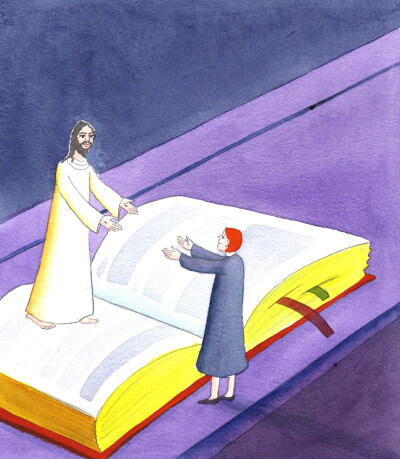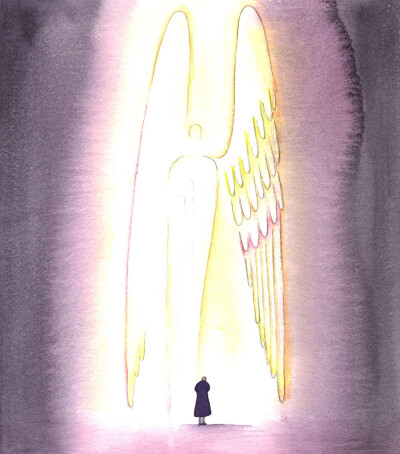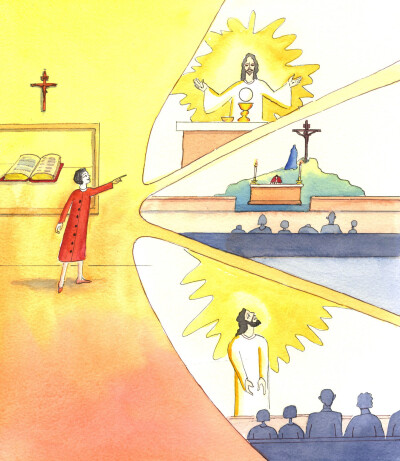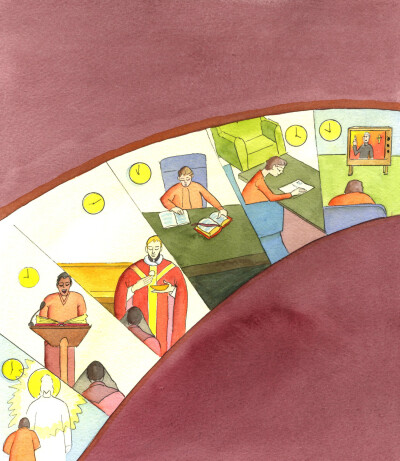Search Page
Showing 41 - 60 of 74
When Christ looked at the naked demoniac, He was full of pity. The man had become separated from those who loved him, and was unhappy, purposeless, filthy and angry. With Divine power, Christ healed him, as He can heal angry people today, who are willing to be healed; and He can give patience to those who suffer from angry insults or assaults.
The Living Word, Who is Christ, is as if waiting to meet us through our reading of Sacred Scripture. We can meet Him there, as well as in our prayer, our spiritual Communions, our visits to Him at the tabernacle, our gathering-together with fellow Catholics - and our supremely powerful and intimate union with Him during the Mass, in Holy Communion.
Christ asks His friends to be brave in speaking the truth about God and goodness; but He also asks us to be prudent. We need not feel guilty about avoiding trouble and controversy when this is possible without cowardice. He Himself ran away or hid, to avoid death, when He had stirred up anger by His words, but when it was too early to fulfil His great plan.
Christ invites us to reflect upon the wearing of a chapel-veil or headscarf by women in past times, or in other parts of the world today. He wants us to know that it is a valuable, visible sign of reverence and humility, in accordance with Scriptural precept and long-standing custom: a sign which He asks us to persevere in.
When we talk about the Magisterium we mean that it is Christ Who has given us the Pope and the other Catholic Bishops, to teach us the truth handed on in Sacred Scripture and in the Sacred Tradition. They teach us right from wrong. To spend a life-time arguing about their sure teaching is to waste valuable time, which we could have spent striving for holiness in the service of God and neighbour.
Does not a great tree spring from a seed, in the dust of the earth? Why should God not have brought a man out of the depth of the earth, by His almighty power? He is capable of doing what is described in Sacred Scripture.
We can look at Pope Benedict, to see a good example of how to relate to people of other religions. He is kind to everyone, and visits other buildings, but does not join in what is called "inter-faith" worship, which is a betrayal of Christian faith and practice, as is plain from the Scriptures and the constant teaching of the Church.
The Church reminds us, in Sacred Scripture and the Sacred Tradition, that God has given us Angels to guard us. If we are in spiritual, moral or physical danger, and call on their aid, they will help us, though we are not usually privileged to witness their presence. We are weak, and God loves to help us in all sorts of ways.
Thousands of people flocked to see Jesus in Galilee, not only because He healed people; it was also because He was such a lovable person: wonderful to be near: helpful, kind and encouraging, as we can read in so many Gospel stories.
Just as sailors at sea know how to 'batten down the hatches' and survive in a storm, because of some basic duties and basic wisdom, so must we hold fast to some Catholic 'basics' that will help us to remain faithful in all the storms of life. We need to know and love Christ, to turn to Him in prayer and in the Sacraments, especially the Holy Sacrifice of the Mass, and Confession. If we study the Scriptures, and ask for the prayers of the Saints and Angels, and show love to our families and to the poor, we do well.
If we could pierce the Heavens, we would still not 'understand' all about God. If we search the Sacred Scriptures, we can find out why Christ came to earth, but we cannot find out everything about the Mind of God in Eternity. He is far above us. We can draw reasonable conclusions about His plan, however. We need not say, 'Christ would have come to earth had man not sinned'. The freedom, through which man sinned, was always part of God's plan; so the sin was always foreseen.
There are three more things that many Catholics need to be told about the Mass - especially children. They know about the gathered Church, the Scriptures, and Holy Communion; it is tragic that so few have learned: 1) Jesus is made Really Present at the Consecration, 2) Through Him, we are made present to the One Sacrifice of Calvary, 3) Jesus, today, prays for us: He prays for our forgiveness and our Salvation.
God has revealed Himself to us through His Son Jesus Christ; and Catholics know that we can rely on Sacred Scripture, the Sacred Tradition, and the Magisterium, to receive the truth handed down to us. We can hear, receive, treasure, and then share the Word of God in ordinary little ways throughout the day.
No-one is exempt. At the end of time, God will bring the 'dead' to life. Everyone has to account to God, at death, for his life and behaviour; but in the end, everyone will rise to hear the Last Judgement of God, as described in Sacred Scripture and the Tradition. We can be glad if we have tried to serve God in humility, and if we have helped other people towards holiness by our intercessions, in earthly life.
How to know Jesus Christ
Finding Christ, Finding Life: a talk by Elizabeth Wang, given at the French Church, Leicester Square, London, 2006.
INTRODUCTION.
You probably know that I’m an artist. The project I’m busy with,…
Holiness, by Elizabeth Wang
This text is the complete version of the pamphlet entitled 'SPEAK ABOUT HOLINESS'. It is based on a talk given by Elizabeth Wang.
Preface.
This little book contains the full version of the text I …
What is Mary Like? by Elizabeth Wang
This text is the complete version of the pamphlet WHAT IS MARY LIKE?
“Now having met together; they asked him, ‘Lord, has the time come? Are you going to restore the kingdom to Israel?’ He replied,…
The Purpose of the Priesthood, by Elizabeth Wang
‘The Purpose of the Priesthood contains encouragement and advice for Catholic priests. It reminds them about the central meaning of the Priesthood, and about the need to teach the Catholic Faith in it…
How to Pray: Preparation, by Elizabeth Wang
This text is published as Chapter 1 of How to Pray (Part One: Foundations), entitled 'How to Prepare'. An introduction to the life of prayer with much practical advice about how to deepen your prayer…
How to Pray: Basics, by Elizabeth Wang
This text is published as Chapter 2 of How to Pray (Part One: Foundations), pages 9-18, entitled 'How to Pray'. An introduction to the life of prayer with much practical advice about how to deepen you…
Showing 41 - 60 of 74














